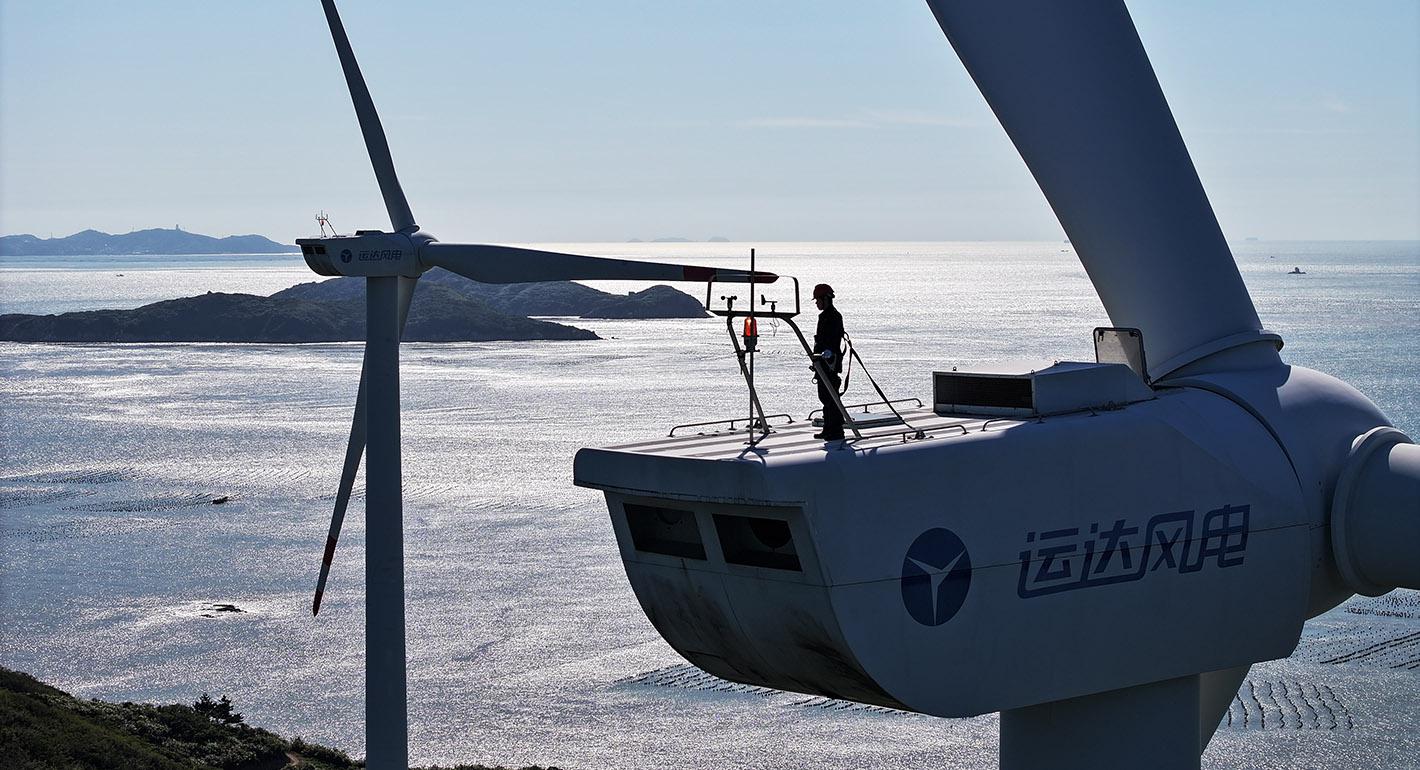Western negotiators often believe territory is just a bargaining chip when it comes to peace in Ukraine, but Putin is obsessed with empire-building.
Andrey Pertsev
{
"authors": [
"Mikhail Korostikov"
],
"type": "commentary",
"blog": "Carnegie Politika",
"centerAffiliationAll": "",
"centers": [
"Carnegie Endowment for International Peace",
"Carnegie Russia Eurasia Center"
],
"collections": [],
"englishNewsletterAll": "",
"nonEnglishNewsletterAll": "",
"primaryCenter": "Carnegie Russia Eurasia Center",
"programAffiliation": "",
"programs": [
"Russia and Eurasia"
],
"projects": [],
"regions": [
"East Asia",
"China",
"Russia",
"Caucasus"
],
"topics": [
"Climate Change",
"Foreign Policy",
"Economy"
]
}
Beijing’s rush to embrace renewable energy—and Moscow’s reluctance—is a systemic threat to economic cooperation between the two countries.
Russia was barely noticeable at the recent COP28 climate summit in Dubai. One reason for this was the Kremlin’s green agenda skepticism: while Russia’s new climate doctrine, published in October, admits the existence of climate change, it also states that the phenomenon requires further study.
Refusing to take climate change seriously means Moscow is already losing money. And it could become even more costly in the medium term if it ends up disrupting trade with China, which has taken a radically different approach.
While China is the world’s largest greenhouse gas emitter, it has also become the biggest producer of green technologies, and is moving to minimize hydrocarbon imports. As Russia seeks to deny the importance of fighting climate change, fearing a threat to the fossil fuel exports that make up the backbone of its economy, China has built one of the planet’s biggest low-carbon industrial sectors.
The differences between the two countries are on display for all to see. Take Russian President Vladimir Putin’s recent interview with China Media Group, in which there was a misunderstanding over a question about the climate. After noting that Moscow and Beijing are—apparently—cooperating on renewable energy, the Chinese journalist asked what this cooperation meant for the future of humanity. Visibly irritated, Putin responded that when it came to sustainable development, there were more important issues than climate change, such as tackling poverty.
Cooperation between China and the United States on climate change is very different. In fact, climate policy has become one of the few bright spots of Sino-American relations in recent years. It may not hit the headlines as much as trade wars or espionage, but it reflects ongoing efforts to build a positive agenda.
Of course, there is no way for Moscow to increase climate cooperation with Beijing to the level that Washington has achieved. This is not because Moscow has nothing to offer: it’s the direct result of a political choice in the Kremlin.
Unlike Moscow, Beijing has found a way to make renewables a pillar of its economy. The energy infrastructure being built by the Chinese means the country will need fewer and fewer supplies from Russia.
In the last decade, China has gone from being an outlier to a world leader in the development of technology aimed at tackling climate change. In June, non-fossil fuel energy sources exceeded 50 percent of China’s total electricity generation capacity for the first time. That’s not to say it is all in use: currently, only about 25 percent of the electricity China uses comes from renewables, while about 56 percent comes from coal. But the utilization rate is constantly growing. Solar, wind, hydro, and nuclear capacity established by China in 2023 will generate an estimated 424 terawatt hours per year, equal to the total electricity consumption of France.
On top of the economic achievements, tackling climate change has also become key to the politics of Chinese leader Xi Jinping, who actively promotes the idea of an “ecological civilization.” Chinese state propaganda takes pride in showcasing the achievements of the green economy.
All of this is a direct threat to Russian fossil fuel exports. In the coming decades, China’s energy consumption habits could change to such an extent that the volume of required Russian hydrocarbons dwindles drastically. The accelerated introduction of electric cars to China—through government subsidies—means that gasoline consumption in China is expected to peak this year, according to forecasts by Chinese oil company Sinopec. Chinese demand for oil should plateau at the end of this decade, after which it is expected to fall.
At the same time as developing renewable energy, which is becoming cheaper, China is trying to maximize domestic hydrocarbon extraction. By 2030, this should mean that China can cut fossil fuel imports by as much as 10 percent.
Both of these trends make China less reliant on the outside world, including Russia. Renewable energy is seen by Beijing not only as a way of tackling climate change, but as a path to energy independence. Sun, wind, and water do not need to be imported, nor are they subject to international price fluctuations. When the sun isn’t shining, the water flowing, or the wind blowing, China has coal-fired power stations that can be run almost entirely on Chinese coal.
There is no immediate threat, and the energy relationship between Russia and China will endure for at least the next five years. China is still the world’s biggest consumer of hydrocarbons, and Russia has become the country’s biggest supplier of them. Chinese consumption of natural gas is expected to rise until at least 2035. But the rate at which China uses coal, oil, and gas will eventually start to slow—and that means competition among suppliers will intensify.
Even now, there are warning signs. Beijing’s intractability in negotiations over the Power of Siberia 2 natural gas pipeline is tied up with China’s green shift. The pipeline was originally planned to bring Russian gas to China’s northern regions—which have become leaders in renewable energy. For the moment, Power of Siberia 2 remains up in the air. There were some expectations it would be agreed when Putin visited China in October, but nothing was signed.
Nor is Russia the only country wanting to build a gas pipeline to China. Central Asian nations are pursuing similar projects, and the states of Southeast Asia are ramping up seaborne gas exports. Having invested deeply in renewables, China can pick and choose its suppliers. Russia, which has doubled down on fossil fuels, does not have nearly so much room for maneuver.
There are also political factors, of course. Hydrocarbons from Russia are delivered via land, and that means the supply cannot be disrupted by the U.S. navy. In the event of a Beijing-Washington confrontation, Moscow’s close ties to Beijing mean Russia is bound to take China’s side. For that reason, Beijing will likely continue to get at least some of its fossil fuel supplies from Russia for as long as possible.
Still, if Sino-American ties do not deteriorate any further, the deciding factors when it comes to Beijing’s decisions on energy will be economic ones. Increasing fossil fuel exports and ignoring the climate agenda may yet turn out to be an own goal for Moscow.
Carnegie does not take institutional positions on public policy issues; the views represented herein are those of the author(s) and do not necessarily reflect the views of Carnegie, its staff, or its trustees.
Western negotiators often believe territory is just a bargaining chip when it comes to peace in Ukraine, but Putin is obsessed with empire-building.

Andrey Pertsev
Unexpectedly, Trump’s America appears to have replaced Putin’s Russia’s as the world’s biggest disruptor.

Alexander Baunov
Baku may allow radical nationalists to publicly discuss “reunification” with Azeri Iranians, but the president and key officials prefer not to comment publicly on the protests in Iran.

Bashir Kitachaev
The Kremlin will only be prepared to negotiate strategic arms limitations if it is confident it can secure significant concessions from the United States. Otherwise, meaningful dialogue is unlikely, and the international system of strategic stability will continue to teeter on the brink of total collapse.

Maxim Starchak
For years, the Russian government has promoted “sovereign” digital services as an alternative to Western ones and introduced more and more online restrictions “for security purposes.” In practice, these homegrown solutions leave people vulnerable to data leaks and fraud.

Maria Kolomychenko